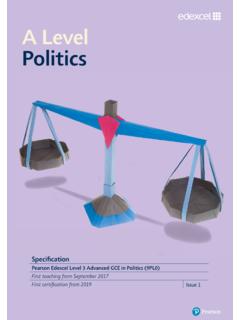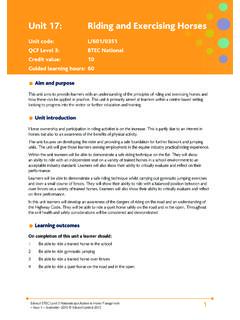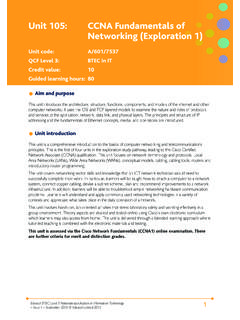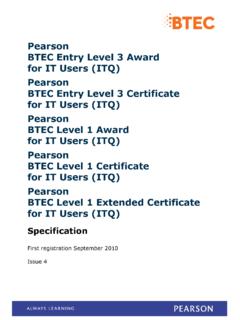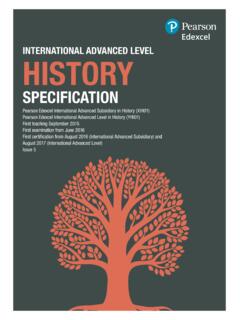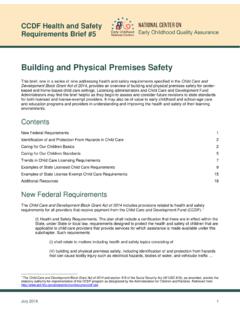Transcription of Unit 2: Leadership and Teamwork in the Public Services
1 unit 2: Leadership and Teamwork in the Public Services unit code: J/600/5987. QCF Level 3: BTEC National Credit value: 15. Guided learning hours: 90. Aim and purpose The aim of this unit is to enable learners to develop a knowledge of Leadership style and an understanding of teams and Teamwork activities within the Public Services . Learners will also gain the skills needed to communicate with, and lead, teams. unit introduction The ability to lead teams is critical to the Public Services . This unit introduces learners to the principles of team Leadership and Teamwork in a Public Services context. It focuses on helping learners to put theory into practice, ensuring that their teams achieve the required objectives. It is important that team leaders are adaptable and able to develop their own skills to deal effectively with team members, encouraging and supporting them. This unit is designed to help learners understand the importance of leading a team. Learners will investigate the different styles of Leadership and how they are used in the Public Services .
2 Learners will explore effective communication skills and have the opportunity to demonstrate them. Learners will explore the other skills needed to lead a team and to get the best out of its members. In a stressful work situation, learners will need to demonstrate that they are able to remain professional and motivated at all times and can lead their team through difficult situations. Learners will find out about the many barriers to good Teamwork and consider how to overcome them. A team is a group of people working together to achieve common objectives and willing to commit the energies necessary to ensure that those objectives are achieved. Effective and efficient teams are an essential element of the work conducted by the Public Services . When people work together in teams, it improves the service provided and helps them to achieve their goals. A motivated team is more likely to be efficient and therefore motivation can contribute to success. If a team has members who cooperate, they can inspire each other.
3 This helps the team to solve problems and also identifies the individual skills within the team. Learners will explore the importance of team development and the benefits of teamworking. They will examine the skills required by different team members and how an effective team leader can motivate and develop individuals within teams. Learners will explore their own abilities to work as team members and identify their individual skills and recognise the contribution they can make to the team. Edexcel BTEC Level 3 Nationals specification in Public Services Issue 2 October 2011 Pearson Education Limited 2011. 1. Learning outcomes On completion of this unit a learner should: 1 Understand the styles of Leadership and the role of a team leader 2 Be able to communicate effectively to brief and debrief teams 3 Be able to use appropriate skills and qualities to lead a team 4 Be able to participate in Teamwork activities within the Public Services 5 Understand team development. Edexcel BTEC Level 3 Nationals specification in Public Services 2 Issue 2 October 2011 Pearson Education Limited 2011.
4 unit content 1 Understand the styles of Leadership and the role of a team leader Leadership styles: authoritarian; democratic; laissez-faire; transactional; transformational; bureaucratic;. people orientated; task orientated; appropriate style for situation; Leadership styles used in the uniformed Public Services Team leader role: position, commanding officer; responsibilities, coordinate multi-agencies; Leadership qualities, decisiveness, adaptability, courage, compassion; Leadership skills, communication, organisation, multi-tasking, planning, motivating 2 Be able to communicate effectively to brief and debrief teams Communication: verbal, tone; non-verbal, body language, listening skills; articulation of ideas; self- presentation; building, morale/confidence; questioning; defusing and resolving conflict; tact; sincerity Briefing teams: ground orientation; safety points; summary of situation; primary aim; method to achieve aim; designated roles; timings; equipment; team motivation; check understanding Debriefing teams: feedback; acknowledge success; identify strengths and weaknesses.
5 Development/action points for future 3 Be able to use appropriate skills and qualities to lead a team Skills and qualities: time management, commitment, motivational, delegation skills Implementing a plan: identify primary aim(s); consider factors, available resources, team member capabilities; select course of action Leading the team: brief team; check understanding including overall aim, individual roles; execute plan;. ongoing quality control, of safety, of performance; achieve aim; debrief team; review and evaluation, goals achieved, identification of skills gap; recommendations for future; reflect on own practice Personal organisation: preparation (organising information/equipment, diary/calendaring events);. identification of issues; scheduling activities; responsibility; accountability; responsiveness; adaptability;. consideration of options; maintaining focus; openness to criticism; importance of personal organisation in Teamwork within the uniformed Public Services 4 Be able to participate in Teamwork activities within the Public Services Types of team: formal, informal; size, small, large; temporary project/task teams; permanent groupings Benefits of teams: contribution to organisational productivity and effectiveness; reduction of alienation.
6 Fostering innovation; sharing expertise; implementing change; identification and development of talent, Belbin Types of Teamwork activities: paper-based exercises, disaster, logistics; activity based, physical training activities, team-building exercises, military/emergency exercises; work-related team activity, achieving work objectives, planning and achieving a project Types of teams in the Public Services : divisional; departmental; sectional; geographical; multi-disciplinary;. regiment; brigade; force; multi-agency/ Services teams; specialist teams, search and rescue, project teams, emergency Services Edexcel BTEC Level 3 Nationals specification in Public Services Issue 2 October 2011 Pearson Education Limited 2011. 3. 5 Understand team development Roles in teams: leader; expert; team player; theories of team roles, Belbin, Honey Team building: recruitment; induction; motivation; training; coaching; mentoring; team knowledge, awareness of team members' strengths; team development, Tuckman; weaknesses; sensitivities.
7 Supporting all team members; how team building is conducted in the uniformed Public Services Team performance: performance indicators; target setting; monitoring; review; performance against targets; support and development of team members; how team performance is evaluated in the uniformed Public Services Team cohesion: definition of team goals; group conflict (actual, potential); group turnover, opportunities for career progression, recognition of contributions Edexcel BTEC Level 3 Nationals specification in Public Services 4 Issue 2 October 2011 Pearson Education Limited 2011. Assessment and grading criteria In order to pass this unit , the evidence that the learner presents for assessment needs to demonstrate that they can meet all the learning outcomes for the unit . The assessment criteria for a pass grade describe the level of achievement required to pass this unit . Assessment and grading criteria To achieve a pass grade the To achieve a merit grade the To achieve a distinction grade evidence must show that the evidence must show that, in the evidence must show that, learner is able to: addition to the pass criteria, in addition to the pass and the learner is able to: merit criteria, the learner is able to: P1 describe the different M1 compare the different D1 evaluate the effectiveness Leadership styles used in the Leadership styles used in the of different Leadership styles Public Services Public Services used in the Public Services P2 identify the role of the team leader in the Public Services [IE3].
8 P3 brief and debrief a team for a M2 brief and debrief a team for D2 evaluate own ability to lead a given task a given task using effective team effectively communication P4 carry out a team task using M3 effectively lead a team task the appropriate skills and using the appropriate skills qualities [TW5] and qualities P5 describe the different types of M4 appraise own performance in D3 evaluate team members'. teams that operate within a team activities performance in team selected Public service activities. P6 participate in team activities [TW1]. P7 explain how team building M5 analyse the impact of good leads to team cohesion in and poor team cohesion on a the Public Services , with Public service, with reference reference to relevant to relevant theorists. theorists. PLTS: This summary references where applicable, in the square brackets, the elements of the personal, learning and thinking skills applicable in the pass criteria. It identifies opportunities for learners to demonstrate effective application of the referenced elements of the skills.
9 Key IE independent enquirers RL reflective learners SM self-managers CT creative thinkers TW team workers EP effective participators Edexcel BTEC Level 3 Nationals specification in Public Services Issue 2 October 2011 Pearson Education Limited 2011. 5. Essential guidance for tutors Delivery To teach learners about the different Leadership styles and personal qualities of Leadership it may be useful to discuss as a group different Leadership styles and qualities, using examples of well-known political or Public service leaders to reinforce the teaching. Learners need to understand what a structured plan would look like in the Public Services from a team leader's perspective. It may be useful to have a lesson on how to plan logically and write clearly, using a structured approach to achieve a given task. It is suggested that the following headings are used: Aim, Planning Factors, Courses of Action Available, Final Plan. In this unit learners will learn how to brief and debrief a team.
10 The approaches for briefing and debriefing a team can be taught in the classroom and followed by practical activities to implement the approaches. It would be useful to focus on how teams can be encouraged and empowered through the briefing to contribute to the successful implementation of the plan. The tutor should provide guidance and feedback on how a clear, effective briefing can be the key to success. Peer-group feedback may also be useful to discuss whether the learner's briefing is sufficiently clear and detailed. Learners also need to understand the skills and qualities required to lead a team and be able to apply them appropriately. Visiting speakers from the Public Services may be able to provide a context of when such skills may be used and examples of how relevant skills are used. Role-play exercises where learners apply and test the skills would also be useful. Scenarios which require the implementation of a plan would provide some useful group-work exercises.
